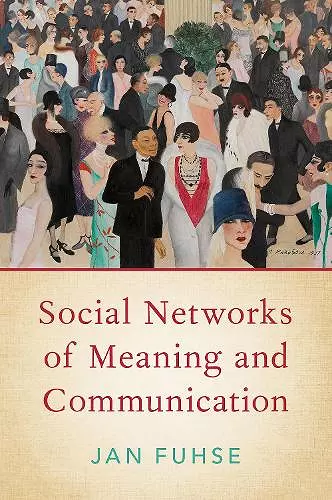Social Networks of Meaning and Communication
Format:Hardback
Publisher:Oxford University Press Inc
Published:5th Jan '22
Should be back in stock very soon

In Social Networks of Meaning and Communication, Jan A. Fuhse offers a coherent theory of social structures as networks of relations interwoven with meaning. Drawing upon and extending the relational sociology of Harrison White and Charles Tilly, Fuhse seeks to establish a theory of social networks. Using a broad range of classic and contemporary social theory, he reconceptualizes social networks as constituted in patterns of expectations that form, reproduce, and change over the course of communicative events. These events, he argues, are the basic building blocks of the social world. They lead to expectations about the behavior of actors and their interaction with others – the meaning structure making for observable regularities of communication in social networks. Social Networks of Meaning and Communication lays out a relational and constructivist perspective of social networks, highlighting a number of implications for social relationships, groups, and collective actors, as well as ethnic categories and cultural differences, roles and institutions, gender and family relations, and methods of social network analysis. Its framework bridges the gap in social network research between technically sophisticated analyses and complex, elusive theorizing.
Jan Fuhse, the leading network theorist in Germany, lays out a theory of social networks that does justice to its cultural and communicative basis. With clarity and a remarkable breadth of view, he unites different forms of networks under a general theory. This masterful book brings insights from systems theory, culture, and philosophical anthropology to the study of social networks. This long-awaited statement will be the starting point for the next generation of network researchers. * John Levi Martin, University of Chicago, and author of Social Structures *
Arguing against the conception of networks as stable and unproblematic patterns of relations, Jan Fuhse roots social networks in communication processes and dynamically evolving bundles of interpersonal expectations. This important work, indispensable for advancing network theory, provides deep reflection and a powerful lens for examining contexts ranging from migrant cultures to love as a relationship frame. * Ronald Breiger, Regents Professor, University of Arizona *
Social Networks of Meaning and Communication offers readers a theory of meaningful, informal social networks, enacted through communication. In this book, scholars of culture will find the truly relational account of meaning they've wanted for decades. Fuhse has written a brilliant reference work, theoretical treatise, and measurement manual—all while engaging interesting and clear empirical data to illuminate the work. * Jennifer C. Lena, Columbia University, and co-author of Measuring Culture *
The key arguments of the book are Fuhse's...and they are important and well-made arguments that everybody working in relational sociology and/or SNA should take note of and can learn from. The book is a rich source of insights that deserves to be widely read. This is a book that needed writing. Fuhse was the perfect person to write it, and he has made a great job of it. It should make a significant impact. * Nick Crossley, American Journal of Sociology *
The idea that societies are vast networks of relations between social actors has a long history in sociology and is currently enjoying something of a renaissance in relational sociology...the central argument of Social Networks of Meaning and Communication by Jan Fuhse is that they comprise "observable regularities in communication" and a "meaning structure" that specifies the identities of participants and related expectations regarding interaction between them. * Nick Crossley, University of Manchester, American Journal of Sociology *
ISBN: 9780190275433
Dimensions: 162mm x 248mm x 25mm
Weight: 626g
344 pages